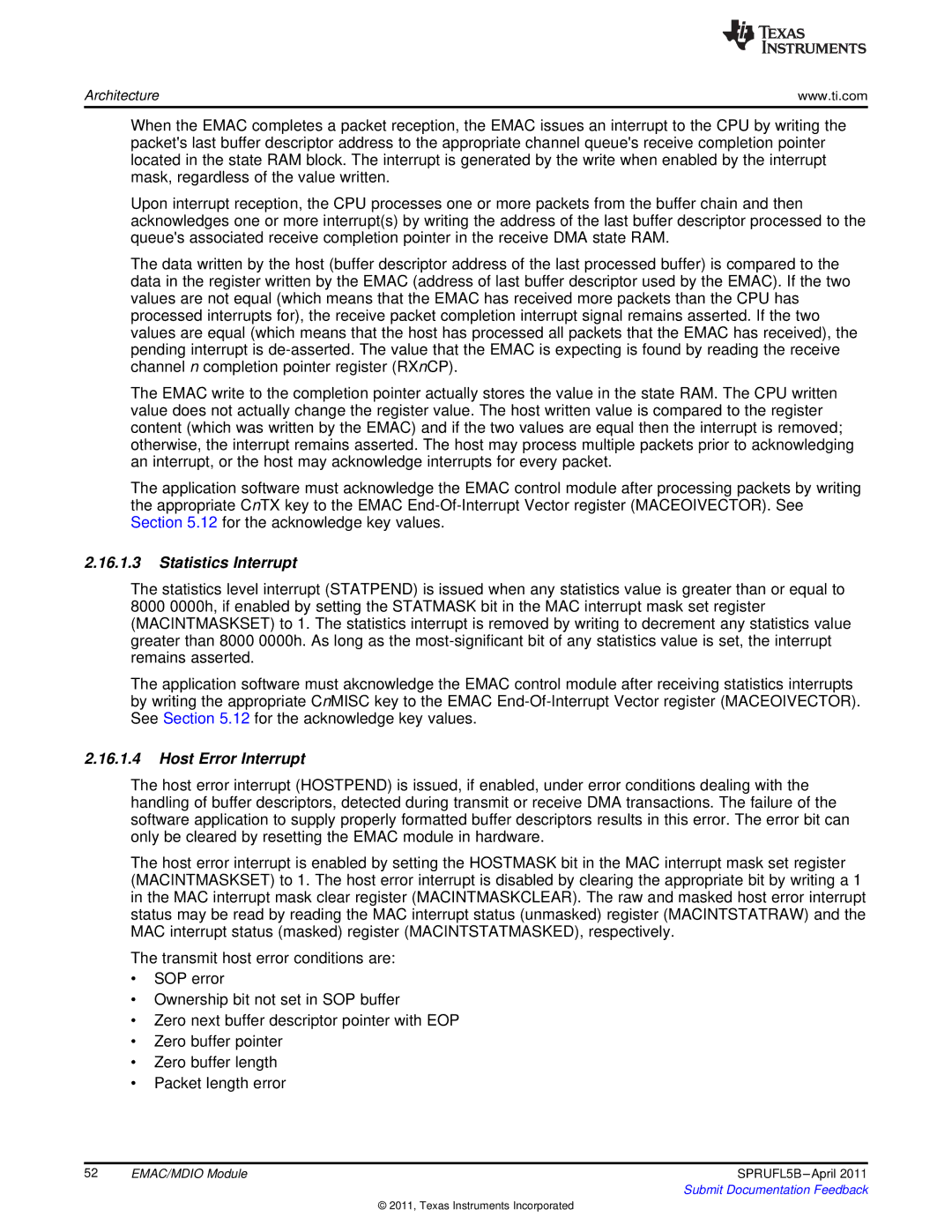
Architecture | www.ti.com |
When the EMAC completes a packet reception, the EMAC issues an interrupt to the CPU by writing the packet'slast buffer descriptor address to the appropriate channel queue'sreceive completion pointer located in the state RAM block. The interrupt is generated by the write when enabled by the interrupt mask, regardless of the value written.
Upon interrupt reception, the CPU processes one or more packets from the buffer chain and then acknowledges one or more interrupt(s) by writing the address of the last buffer descriptor processed to the queue'sassociated receive completion pointer in the receive DMA state RAM.
The data written by the host (buffer descriptor address of the last processed buffer) is compared to the data in the register written by the EMAC (address of last buffer descriptor used by the EMAC). If the two values are not equal (which means that the EMAC has received more packets than the CPU has processed interrupts for), the receive packet completion interrupt signal remains asserted. If the two values are equal (which means that the host has processed all packets that the EMAC has received), the pending interrupt is
The EMAC write to the completion pointer actually stores the value in the state RAM. The CPU written value does not actually change the register value. The host written value is compared to the register content (which was written by the EMAC) and if the two values are equal then the interrupt is removed; otherwise, the interrupt remains asserted. The host may process multiple packets prior to acknowledging an interrupt, or the host may acknowledge interrupts for every packet.
The application software must acknowledge the EMAC control module after processing packets by writing the appropriate CnTX key to the EMAC
2.16.1.3Statistics Interrupt
The statistics level interrupt (STATPEND) is issued when any statistics value is greater than or equal to 8000 0000h, if enabled by setting the STATMASK bit in the MAC interrupt mask set register (MACINTMASKSET) to 1. The statistics interrupt is removed by writing to decrement any statistics value greater than 8000 0000h. As long as the
The application software must akcnowledge the EMAC control module after receiving statistics interrupts by writing the appropriate CnMISC key to the EMAC
2.16.1.4Host Error Interrupt
The host error interrupt (HOSTPEND) is issued, if enabled, under error conditions dealing with the handling of buffer descriptors, detected during transmit or receive DMA transactions. The failure of the software application to supply properly formatted buffer descriptors results in this error. The error bit can only be cleared by resetting the EMAC module in hardware.
The host error interrupt is enabled by setting the HOSTMASK bit in the MAC interrupt mask set register (MACINTMASKSET) to 1. The host error interrupt is disabled by clearing the appropriate bit by writing a 1 in the MAC interrupt mask clear register (MACINTMASKCLEAR). The raw and masked host error interrupt status may be read by reading the MAC interrupt status (unmasked) register (MACINTSTATRAW) and the MAC interrupt status (masked) register (MACINTSTATMASKED), respectively.
The transmit host error conditions are:
•SOP error
•Ownership bit not set in SOP buffer
•Zero next buffer descriptor pointer with EOP
•Zero buffer pointer
•Zero buffer length
•Packet length error
52 | EMAC/MDIO Module | SPRUFL5B |
|
| Submit Documentation Feedback |
© 2011, Texas Instruments Incorporated
